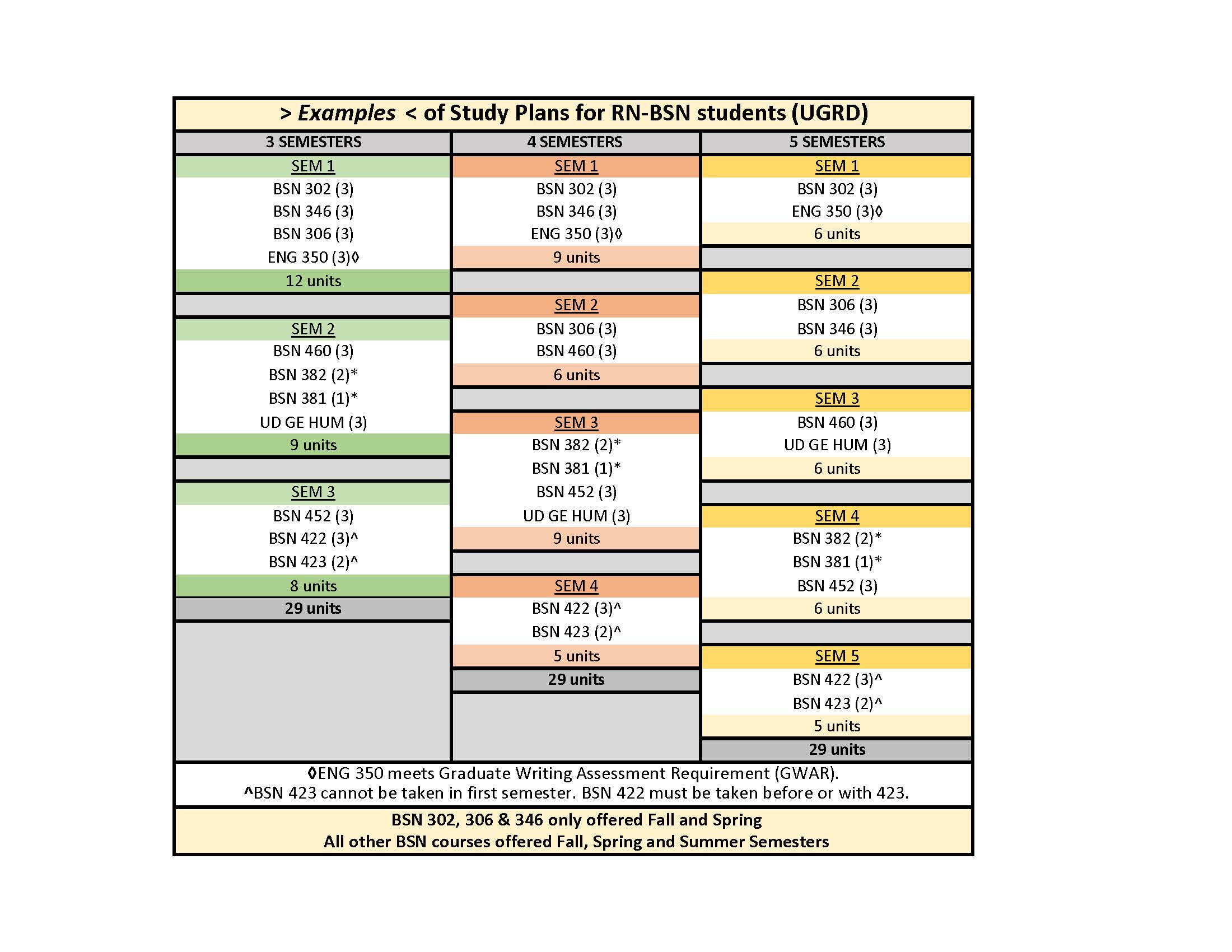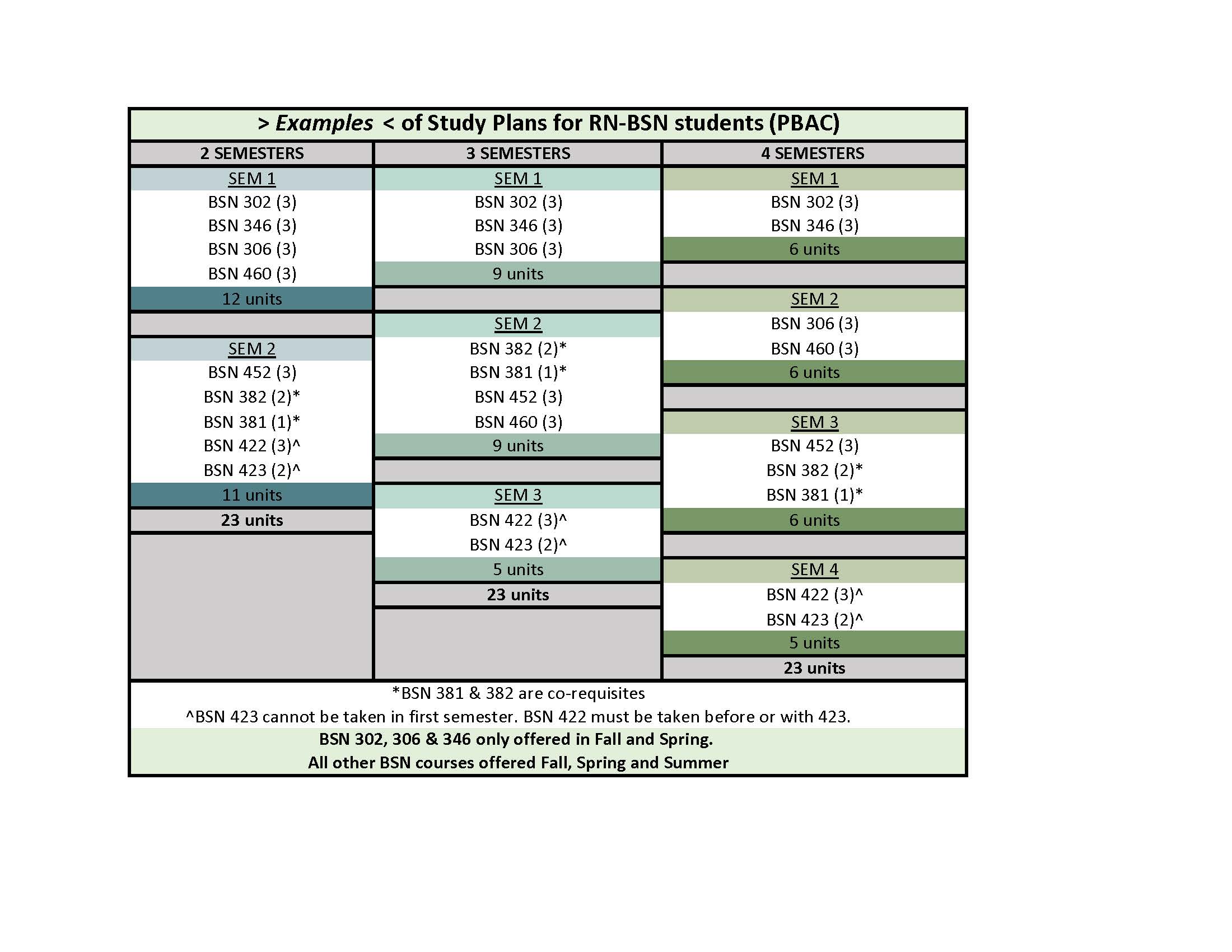Curriculum
Latest News
RN-BSN Curriculum
Example RN-BSN study plans for Undergraduate and Post-baccalaureate students:
| Undergraduate | Post-baccalaureate |
 |  |
New Students: Once admitted and evaluated by the University you will be able to access your Academic Requirements Report which will allow you to see the course credit you have and the course credit you need to graduate with your BSN.
Academic Requirements Report instructions.
| BSN Coursework | ||
| BSN 302 | Concepts of Professional Nursing Practice | (3) |
| BSN 306 | Cultural Diversity and Healthcare | (3) |
| BSN 346 | Human Pathophysiology | (3) |
| BSN 382 | Health Assessment | (2) |
| BSN 381 | Health Assessment Skills Seminar | (1) |
| BSN 422 | Community-Based Nursing | (3) |
| BSN 423 | Community-Based Nursing Role Performance | (2) |
| BSN 452 | Management and Leadership in Health Care Systems | (3) |
| BSN 460 | Nursing Research Utilization | (3) |
| BSN units | 23 | |
| University Degree Requirements | ||
| ENG 350 | Advanced Composition | (3) |
| AREA C | GE - Upper Division Humanities (undergrads only) | (3) |
| Additional units | 6 |
The SON has been approved to give 24 units for NCLEX credit to our BSN students once they earn their RN license, starting in the Spring 2021 catalog. The NCLEX Unit Form needs to be submitted in order to receive credit. Students may receive up to 24 units of NCLEX credit, in order to meet the 120 units required for a BSN degree, once all other transferable credit has been assigned. The detailed information can be found in the BSN curriculum Change-Implementation Plan.
RN-BSN Program Advisement
For prospective student advisement please email: SONDepartment@csudh.edu
RN-BSN Academic Advisement 
For current, matriculated student degree and major advisement please follow these instructions to make an appointment with a BSN Major/Academic Advisor.
Zoom, Phone, or in-person appointments - You are now able to schedule your advising appointment via the Toro Success Collaborative Icon on your MyCSUDH.
Follow the next steps to set up the advising appointment:
- Select "Schedule an Advising or Tutoring Appointment" on the right hand side.
- Select Advising
- For the Service, you can select from the following: Major Advising, General Education Advising, Graduation Check, Change of Major, or Academic Probation.
- Select Find Available Times. You should now be able to view day/times available of the advisor you have been assigned to. Make sure to include in the comments sections, if you prefer, in-person, Zoom, or phone appointment.
- Click on View my Appointments to get full details or check your email for your email confirmation.
Course Descriptions
BSN 302 - Concepts of Professional Nursing Practice (3)
Focuses on concepts essential to the baccalaureate prepared nurse for socialization into the full professional role. Incorporates The Essentials of Educated Baccalaureate Education for Professional Nursing Practice (2008). Content areas include returning to school and role development, historical nursing influences, nursing theory, ethical practice, quality practice, accountability and professional nursing issues/trends.
BSN 306 - Cultural Diversity and Healthcare (3)
Applies cultural concepts and models to explore various forms of human diversity. Analyzes how cultural diversity affects health beliefs, health care behaviors, and health/illness dynamics. Discusses ethnocentrism and bias and their impact on health care. Helps to build cultural competence and improve health care delivery.(UD GE Integrative Studies: Social Science)
BSN 346 - Human Pathophysiology (3)
Recommended Prerequisite: BSN 302. Explores the response of the human body to various disease processes. Examines the rationale behind diagnosis and treatment of illness and injury. Contrasts the environmental and genetic components that contribute to health/illness. Emphasizes research advances in genetics and biomedical sciences, especially related to HIV/AIDS and quality of life. (UD GE Integrative Studies: Natural Science)
BSN 382 - Health Assessment (2)
Recommended Prerequisite: BSN 346. Recommended Co-requisite: BSN 381.
Students examine the theoretical knowledge and psycho-motor skills necessary to perform a comprehensive health history and physical examination on the pediatric, adult, and geriatric patient.
BSN 381 - Health Assessment Skills Seminar (1)
Prerequisite: BSN 346 is recommended. Corequisite: BSN 382 is recommended. Provides the opportunity for application of basic knowledge and the practice of skills related to performing a complete nursing health assessment of pediatric, adult, and geriatric patients. Requires 16 hours of practice in a clinical laboratory. CR/NC grading.
BSN 422 - Community-Based Nursing (3)
Prerequisites: BSN 302, BSN 346, BSN 382, and BSN 381, or concurrent enrollment are required. Co-requisite: BSN 423 is required. Explores dimensions of community-based nursing from individual/family health to community's overall health levels. Explores nursing scopes and responsibilities in healthy promotion and education, disease prevention, and risk reduction. Examines how epidemiological and evidence-based practice principles may be applied in order to assess, plan, implement, and evaluate community-based nursing interventions.
BSN 423 - Community-Based Nursing Role Performance (2)
Prerequisites: BSN 302, BSN 346, BSN 382, BSN 381, and BSN 422 (BSN 422 may be concurrent enrollment). Provides an opportunity for application of the knowledge and the skills of the community-based nurse in a community setting. Requires 90 hours of clinical practice with a preceptor for the Public Health Nurse Certificate.
BSN 452 - Management and Leadership in Health Care Systems (3)
Required Prerequisite: BSN 302. Recommended Prerequisite: BSN 460. Introduces concepts of leadership, management, advocacy and roles of the professional nurse in relation to career planning, organizational and system-wide change. Topics include professionalism, ethics, power, quality, safety, inter-professional collaboration, changes, group dynamics, finance, technology, and strategic planning.
BSN 460 - Nursing Research Utilization (3)
Examines scientific clinical nursing rationale for research utilization and theory-based practice. Presents concepts of research methods and processes. Analyzes relevant nursing problems for clinical effective practice.
ENG 350 - Advanced Composition (3)
Rhetorical modes, techniques of emphasis, strategies of editing and revising. May not be counted toward major/minor or M.A. in English except for teacher candidates; may count only twice toward elective credit. Satisfies graduation competency-in-writing requirement. Graded A-C/NC. Repeatable course. Fee required.
AREA C - Humanities (3) General Education Must be Upper Division
Courses educate students to be global citizens who are equipped to make independent judgments using their own imagination and reason.
Prior curriculum compared to New curriculum. [PDF version]
For more information, please email SONdepartment@csudh.edu